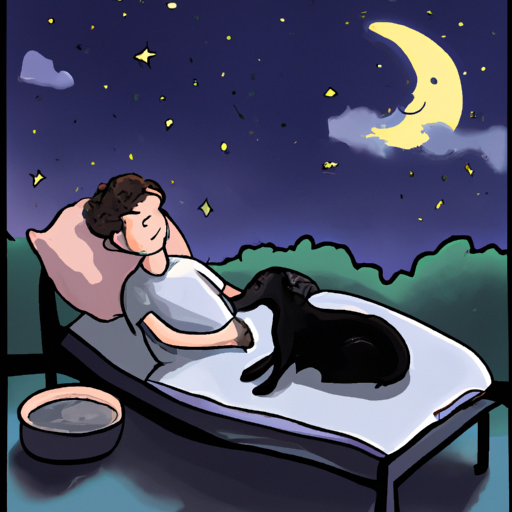1. Understanding Your Dog’s Sleep Needs
Dogs, like humans, have different sleep needs depending on their age, breed, and health. Puppies and older dogs tend to sleep more, while working breeds may require less sleep. Understanding your dog’s sleep needs can help you establish a beneficial sleep routine. Here are the general guidelines for dog’s sleep:
| Age/Breed/Health | Average Sleep Hours |
|---|---|
| Puppies | 18-20 |
| Adult Dogs | 12-14 |
| Older Dogs | 16-18 |
| Working Breeds | 10-12 |
2. Creating A Comfortable Sleep Environment
A comfortable sleep environment is crucial for your dog’s sleep. Ensure that your dog has a quiet, dark, and cozy place to sleep. This could be a dog bed, a crate, or even a designated area in your room. Adding a blanket or favorite toy can also help make the space feel more secure and inviting.
3. Establishing a Consistent Sleep Schedule
Dogs thrive on routine. Try to keep a consistent schedule for meals, play, and sleep. This can help regulate your dog’s internal clock and promote better sleep.
- Morning: Feed and walk your dog.
- Afternoon: Play and exercise.
- Evening: Feed and take a short walk.
- Bedtime: Allow your dog to settle and sleep.
4. Engaging in Regular Exercise
Regular exercise can help tire your dog out and promote better sleep. Try to incorporate both physical activity like walks or games of fetch, and mental stimulation like training sessions or puzzle toys, into your dog’s daily routine.
5. Limiting Evening Activity
As bedtime approaches, limit your dog’s activity. This could mean turning off the TV, dimming the lights, and avoiding vigorous play. This can help signal to your dog that it’s time to wind down and sleep.
6. Considering a Bedtime Snack
Some dogs might benefit from a small bedtime snack. Make sure this snack is healthy and not overly filling. A stuffed Kong or a dog-friendly biscuit can work well.
7. Using Calming Techniques
If your dog struggles to settle, calming techniques can help. This could involve gentle petting, soft music, or even calming scents like lavender. A calming pet bed or weighted blanket could also be beneficial.
8. Consulting a Vet If Needed
If your dog consistently struggles with sleep, it may be worth consulting a vet. They can rule out any underlying health issues and provide guidance based on your dog’s specific needs.
FAQs
Q: Can I let my dog sleep in my bed?
A: While it ultimately depends on your preference and your dog’s behavior, letting your dog sleep in your bed is generally not recommended. It can disrupt your sleep and create dependency issues.
Q: How can I tell if my dog is getting enough sleep?
A: Dogs that are getting enough sleep will typically be alert and energetic during their waking hours. Signs of sleep deprivation can include lethargy, irritability, and difficulty focusing.
Q: What if my dog has nightmares?
A: If you notice your dog whimpering, twitching, or appearing distressed during sleep, they may be having a nightmare. It’s generally best to let them sleep it off, but if the nightmares are frequent or severe, consult a vet.
Q: Can I use sleep aids for my dog?
A: Always consult a vet before giving your dog any kind of sleep aid. Some are safe for dogs, but the dosage and frequency should be determined by a professional.



